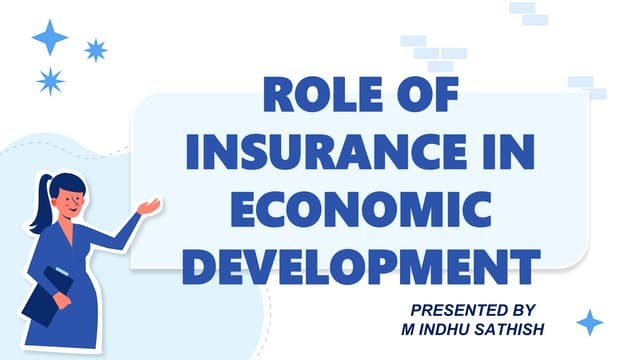
Insurance plays a quietly powerful role in maintaining economic stability, often operating behind the scenes until a crisis brings its importance into sharp focus. At its core, insurance is a mechanism for managing risk, and in doing so, it provides individuals, businesses, and governments with the confidence to invest, innovate, and grow. Without the safety net that insurance offers, economic activity would be far more cautious, and the consequences of unforeseen events could be devastating not just for those directly affected, but for the broader economy as well.
One of the most immediate ways insurance contributes to economic stability is by cushioning the impact of financial shocks. When a natural disaster strikes, a business suffers a major loss, or a family faces a medical emergency, insurance steps in to absorb the financial blow. This transfer of risk from the individual or enterprise to the insurer prevents cascading effects that could otherwise destabilize entire sectors. For example, after a hurricane damages thousands of homes and businesses, insurance payouts help fund repairs, keep contractors employed, and restore consumer confidence. Without that support, recovery would be slower, unemployment could rise, and local economies might struggle to regain momentum.
Insurance also plays a critical role in facilitating credit and investment. Lenders are more willing to extend loans when they know that the borrower’s assets are protected. A bank financing a new factory, for instance, will require property insurance to safeguard its collateral. Similarly, investors are more likely to back startups or expansion projects when key risks—such as liability, cyber threats, or supply chain disruptions—are covered. This risk mitigation encourages entrepreneurship and economic dynamism, allowing capital to flow more freely and efficiently. In this way, insurance acts as a lubricant for the financial system, reducing friction and enabling growth.
On a macroeconomic level, insurance helps stabilize public finances. Governments often rely on insurance markets to manage risks associated with infrastructure, public health, and disaster response. In some cases, they partner with private insurers to create public-private solutions, such as crop insurance programs that protect farmers from drought or flood. These arrangements reduce the fiscal burden on governments during emergencies and ensure that aid reaches affected populations more quickly. Moreover, by promoting resilience at the individual and community level, insurance reduces the need for large-scale bailouts or emergency spending, preserving budgetary discipline and long-term planning.
The insurance industry itself is a significant contributor to economic stability through its investment activities. Insurers collect premiums and invest those funds in a wide range of assets, including government bonds, corporate debt, and infrastructure projects. These investments provide liquidity to financial markets and support long-term development. Because insurers tend to be conservative investors with a focus on stability and yield, their presence adds a layer of steadiness to markets that might otherwise be more volatile. In times of economic uncertainty, the capital held by insurance companies can act as a buffer, helping to maintain confidence and prevent panic.
Another important dimension of insurance’s role in economic stability is its influence on behavior. By pricing risk and offering incentives for risk reduction, insurers encourage safer practices across industries. For example, auto insurers reward safe driving with lower premiums, while property insurers may offer discounts for installing fire alarms or storm shutters. These incentives lead to fewer accidents, less damage, and lower overall costs, which benefits not only the insured but society at large. In the business world, liability insurance often drives companies to adopt stronger compliance measures and ethical standards, reducing the likelihood of costly litigation or reputational harm.
Insurance also fosters social stability by providing a safety net for individuals and families. Health insurance ensures access to medical care without financial ruin, life insurance offers security to dependents, and disability insurance protects income in the face of unexpected setbacks. These protections reduce anxiety and promote well-being, allowing people to participate more fully in the economy. When individuals feel secure, they are more likely to spend, invest, and take calculated risks, all of which contribute to economic vitality. Conversely, in societies where insurance coverage is limited or unreliable, economic activity tends to be more constrained and vulnerable to disruption.
The global nature of insurance further enhances its stabilizing effect. Reinsurance markets, which allow insurers to spread risk across borders, help prevent localized disasters from overwhelming national systems. A major earthquake in one country, for instance, may be partially covered by reinsurers in other regions, distributing the financial impact and enabling a faster recovery. This interconnectedness makes the insurance industry a key player in global risk management, supporting resilience not just within nations but across the international economy.
Of course, insurance is not a panacea. It cannot eliminate risk entirely, and its effectiveness depends on sound regulation, transparent practices, and public trust. When insurers fail to honor claims or engage in opaque pricing, confidence erodes and the system falters. That’s why regulatory oversight and consumer education are essential components of a stable insurance market. Ensuring that policies are clear, fair, and enforceable helps maintain the integrity of the system and reinforces its role as a pillar of economic stability.
In the end, insurance is more than a financial product—it’s a foundational element of modern economic life. It enables progress by making risk manageable, supports recovery when setbacks occur, and promotes resilience at every level of society. Whether through individual protection, business continuity, or public policy, insurance helps keep the wheels of the economy turning, even in the face of uncertainty. Its quiet strength lies in its ability to absorb shocks, encourage prudent behavior, and provide the confidence needed to build, grow, and thrive.